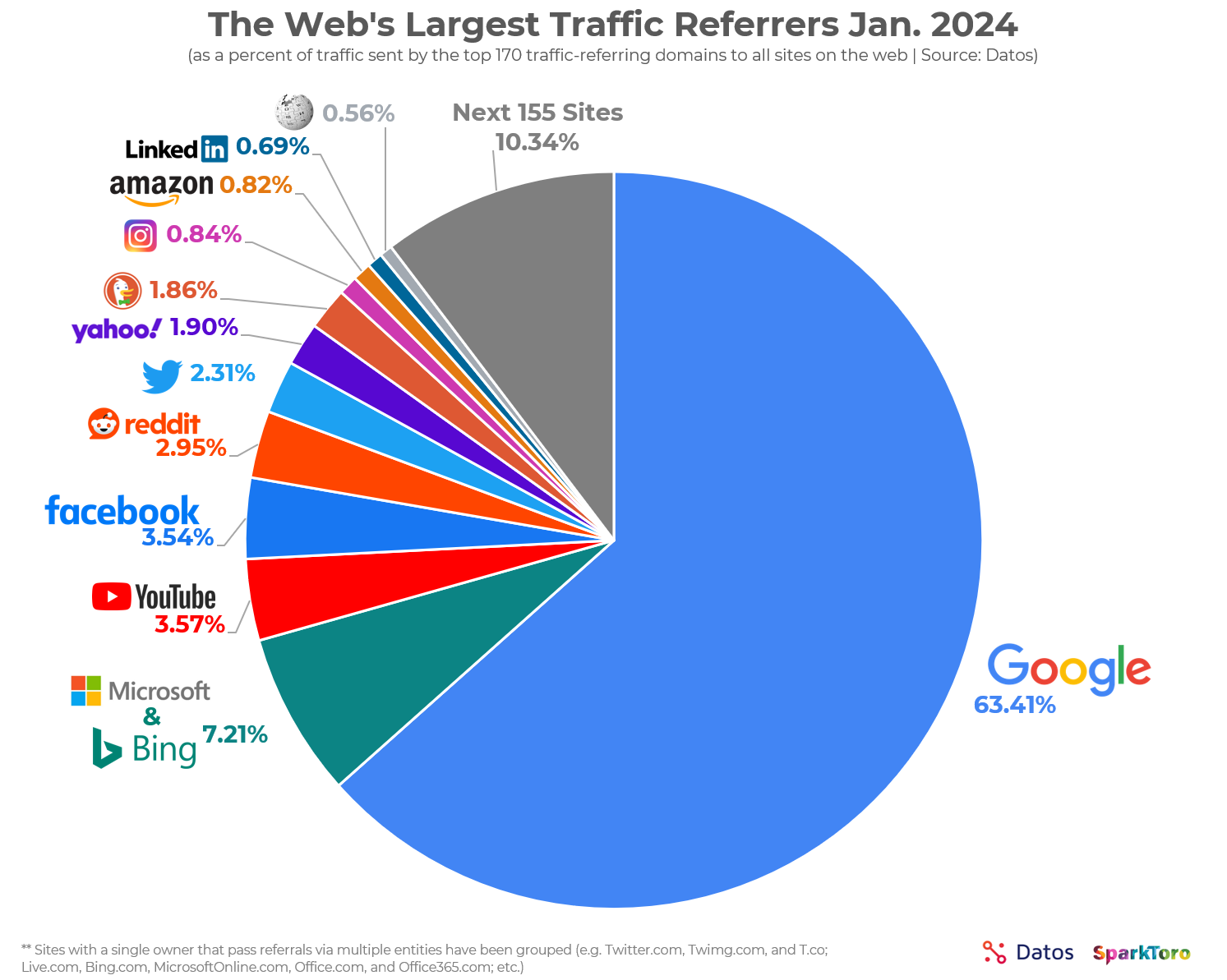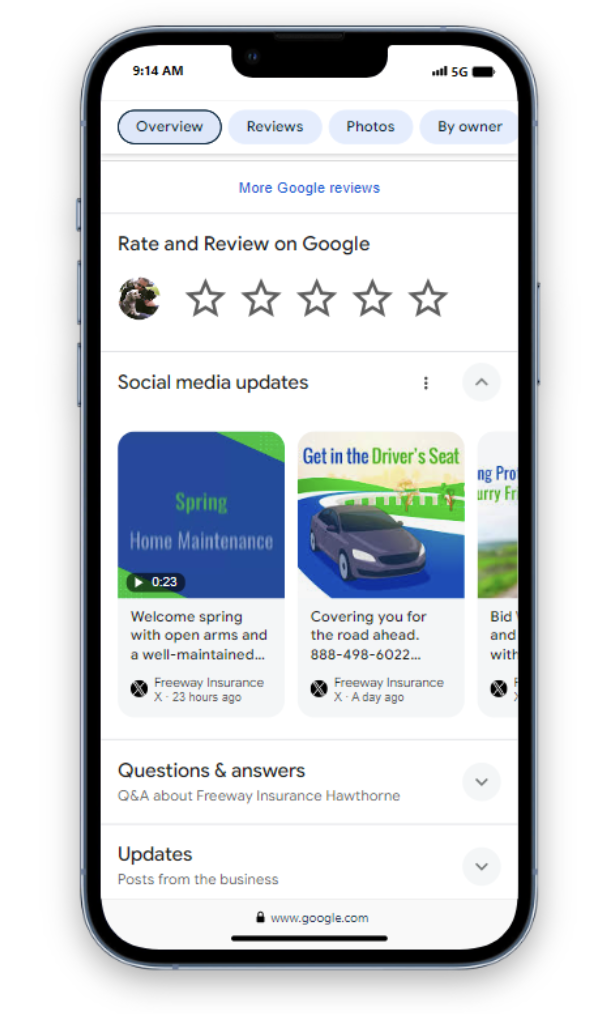How Negative Reviews Impact Your Business (and How to Fix Them Fast)
Local Memo: Google Refers 63% of All Web Traffic

Local Memo: Google Refers 63% of All Web Traffic
In this week’s update, learn about which sites send the most referral traffic to the open web; severe penalties from Google’s core and spam updates; social posts, LSAs from competitors, and bookable services in Google profiles; and an update on the vote to ban TikTok in the U.S.
Google Refers 63% of All Web Traffic
A new study from Moz and SparkToro founder Rand Fishkin finds that, unsurprisingly, Google is the most significant referrer of traffic to the open web. What’s new in Fishkin’s study, conducted in collaboration with Datos whose users opted in to provide the required data, is the detail it provides around traffic flow on the internet via Google and other properties.
The study finds that 63% of all web traffic runs through Google, which refers nearly 100 domains per month for every unique user. Microsoft’s various properties are second on the list at 7%, followed by YouTube, Facebook, Reddit, and several others taking up shares above 1%. Google’s referral traffic is almost 10X greater than any other platform.
Fishkin also finds that referral trends favor the top 170 sites on the internet. From January 2023 to January 2024, the proportion of referrals to top sites grew by 3.2% in comparison to what he calls the “Long Tail,” comprising sites outside the top 170. As of this January, 45.4% of all traffic was driven to the top 170 sites.

Google’s Core and Spam Updates Result in Severe Penalties
On March 5, Google launched both the March Core Update and a spam update that together target low-quality content on the web. These two parallel updates are unusually broad in their scope, aiming to reduce unhelpful content on the web by 40% and predicted by Google to roll out over a full month, as opposed to the two weeks that has been more common in the past. Already, SEO professionals are noting that several sites have been taken down by manual actions on Google’s part due to being flagged as “pure spam,” a category that causes a site to be deindexed either partially or entirely — meaning it may no longer show up in web searches.
According to a recap from Lily Ray, the spam update, which is the source of the manual actions, targets (among other things) sites that have been too aggressive in their use of AI to build out low-quality content in order to rank. Ray notes that this strategy is, in part, based on a selective interpretation of Google’s statements over the last several months indicating that AI content will not be penalized. However, Google in its statements has also pointed out repeatedly that content must be helpful to humans, and sites penalized by the spam update are presumably missing this point.
Social Posts Appearing in Google Profiles
Google made a feature available to businesses in October 2023 that allows them to add links to social sites like Facebook and Instagram. (Before that, social links appeared in profiles but could not be directly controlled by the business.) Now users are seeing a feed of social posts from those sites appearing in profiles that have added social links. A new help page from Google explains how to add social media links and notes, in a recent update, “Business Profiles with an associated social media link may find their social media posts surfaced on their Business Profile automatically.”
Businesses can specify one link per platform, making it especially important for multi-location brands to have a distinct social profile for each location on sites like Facebook. The social feed seems to display posts from one platform at a time.

Competitors Showing in Google Listings from LSAs
Anthony Higman has spotted evidence that Google is showing competitor Local Service Ads (LSAs) in business listings for attorneys, a development that will potentially impact other service categories. For some time, Google has selectively shown competitors in Google profiles, and LSAs do appear in the local pack and local finder for some service-oriented searches, but this is the first mention I’ve seen where LSAs are showing up in a business profile.

Courtesy Anthony Higman / Search Engine Roundtable
Google Adds Bookable Services Menu to Profiles
Users have spotted an addition to the services section on the mobile version of Google Business Profiles, specifying services that can be booked at the location and including a button to initiate the booking workflow. Presumably these services are supported by Reserve with Google, the program that utilizes third party booking services who have integrated with Google’s booking API. Though the ability to book services via profiles has been around since 2017, this presentation of bookable services seems fairly new.

Courtesy Claudia Tomina / Search Engine Roundtable
House of Representatives Votes to Ban TikTok in the U.S.
The House of Representatives has voted with overwhelming bipartisan support on a proposed ban of TikTok in the United States. The bill references the app’s threat to national security due to the control of parent company ByteDance by authorities in China. Proponents say they don’t want to ban the app per se, but rather to remove its foreign owners, but if ByteDance refuses divestiture a ban would follow. ByteDance and its supporters say freedom of expression is at issue, and TikTok has urged U.S. users to oppose the legislation.
President Biden has expressed support for the ban, but it faces a difficult road in the Senate, where Democratic leaders favor alternate legislation limiting the power of foreign companies that control digital properties in the U.S.




